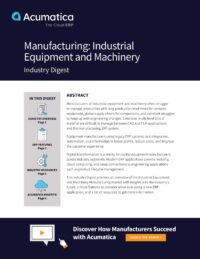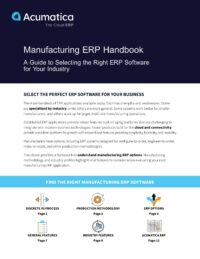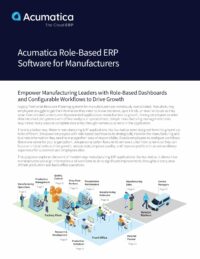Manufacturing Cloud ERP Use Cases
After implementing a manufacturing cloud ERP solution, make-to-stock, make-to-order, engineer-to-order, project-centric, job shop, batch, and repetitive manufacturers can become a lean, automated business by:
- Making better decisions with greater visibility and communication
- Controlling engineering changes and fix bill of material (BOM) and routing errors
- Balancing supply and demand
- Improving product cost
- Forecasting sales, scheduling resources, and calculating capacity requirements accurately
- Improving quality through efficient and automated scheduling/material grouping
- Integrating with critical third-party applications
Devil’s Peak Brewing Company (DPBC) is a manufacturer that experienced these benefits. Since 2012, DPBC has been producing an incredible variety of American, Belgian, and English-style ales. As their popularity grew, so too did their supply chain and operating system complexities. DPBC needed a comprehensive cloud ERP solution. They chose Acumatica Cloud ERP, and Managing Director Derek Szabo says, “Acumatica was able to handle the full end-to-end functionality, it was cloud-based, and it was exceptionally cost effective.”
He also says, “Full supply chain visibility will enable us to target the areas where we have issues and tackle them, to ensure we are operating efficiently and driving growth across sales, supply chain, manufacturing, and finance.”
Types of Manufacturing ERP features by Industry
Manufacturing ERP is available from larger, general publishers, and smaller publishers focused on specific industries. General ERP solutions support multiple industries with strong cross functional processes and applications. General ERP systems offer more specialized features today than ever before. Smaller ERP vendors focus on niche industries with specialized systems. Manufacturers must choose between the two options. Below is an overview of features common for each industry segment.
Food and Beverage
Manufacturers of food and beverage products can be either discrete or process. They may require batch processing, lot tracking, and recipe or formula management. Catch weights, unit of measure conversions, expiration dates, and variable product packaging are also common. Route management for direct store delivery (DSD) is required for some businesses.
Apparel, Leather and Jewelry
Matrix items are an essential requirement for textile, leather, apparel, and jewelry products to manage pricing and availability across product families where style, color, and size combinations are difficult to manage. Commerce integration, retail sales, and product configuration are also popular. PLM is also a major requirement.
Chemicals and Life Sciences
Chemical, petroleum, pharmaceutical, coatings, cosmetics, and similar businesses are predominantly process-based. Batch production, formula and recipe management, and lot tracking are essential. Advanced features include potency, concentrations, specific gravity, and yield and loss tracking. Compliance for the EPA, FDA, and other regulations are also common.
Wood Products
Few ERP systems support the wood, lumber, and building products industry well. Features such as matrix items are useful for managing items with slight variations such as dimensions or grade. Other requirements common in the industry include co-products, by-products, lot tracking, and point of sale for in-store sales.
Furniture and Home Goods
Product configuration is a must-have for most furniture manufacturers. Commerce and retail sales are also increasingly common for manufacturers of furniture and home goods. Other requirements include CAD or PLM integration and serial tracking.
Paper Products
Paper product manufacturers include paper mills and manufacturers of cardboard, envelopes, and publications. Paper mills have specialized requirements best suited for process-oriented ERP systems. There are specialized ERP systems for the publishing industry to manage writing and layout for books and magazines. Other companies in this industry rely on general manufacturing ERP systems for basic manufacturing capabilities.
Industrial Equipment
Industrial machinery manufacturers rely heavily on serial tracking, engineering change orders, CAD and PLM integration, and product configuration. Many also require warranty and service management for installation and repair.
Electronics and Electrical
Engineering change orders and integration with CAD and PLM applications are crucial for electronics, electrical, and high-tech manufacturers. Product configuration and commerce are both common for commercial and consumer products. Serial and lot tracking and warranties are common as well.
Automotive and Transportation
Repetitive, cellular, and lean manufacturing are common in the automotive industry. Cumulative demand forecasts and EDI are prevalent. Serial tracking and warranties are essential for component traceability to vehicle identification numbers (VIN). Project management applications help manage programs. Kanban, quality, and engineering change orders are also prevalent.
 Canada (English)
Canada (English)
 Colombia
Colombia
 Caribbean and Puerto Rico
Caribbean and Puerto Rico
 Ecuador
Ecuador
 India
India
 Indonesia
Indonesia
 Ireland
Ireland
 Malaysia
Malaysia
 Mexico
Mexico
 Panama
Panama
 Peru
Peru
 Philippines
Philippines
 Singapore
Singapore
 South Africa
South Africa
 Sri Lanka
Sri Lanka
 Thailand
Thailand
 United Kingdom
United Kingdom
 United States
United States




